When I finish watching a movie, I sometimes go to Wikipedia to see what critics think. I did that after watching Tom Holland’s Thinner for the third or fourth time.
I specifically wanted to see if there was a section devoted to the film’s legacy and cult following. Thinner is a spectacularly silly movie. It’s incredibly stupid, yet it possesses a strange X factor that sets it apart.
There is no Cult or Legacy section on Thinner’s Wikipedia page. Instead, the article gives the last word to a critic who gave it a D-, whining unbearably, “Thinner's problems begin with a grotesquely unconvincing fat suit and makeup” and complaining that Burke's "cartoonish performance matches the tone of a film that's broadly comic and often just plain broad without containing much in the way of jokes, let alone genuine wit or suspense.”
What a humorless tool! It’s just a fucking movie!
It brings me no joy to report that the asshole who panned Thinner was Nathan Rabin from The A.V. Club. That’s me! How confusing! What the fuck is wrong with that guy? Does he think every movie needs to be Citizen Kane? He’s probably one of those elitist jerks who hates horror movies and looks down on fright fans as mouth-breathing sub-humans!
I was both surprised and not surprised to see that Wikipedia had given me the final word on Thinner and that it was not positive.
I had quite a cultural footprint when I was the head writer of The A.V. Club. That’s both flattering and depressing. It’s flattering because people paid attention to my writing. It’s depressing because my writing here and at Nathan Rabin’s Happy Place doesn’t have anywhere near the audience and, consequently, the impact or power.

Thinner began life as a 1984 novel credited to Richard Bachman, Stephen King’s pseudonym. The novel led to King being outed as the real author of the book, as well as previous novels Rage (a school shooting-themed thriller King let fall out of print after it was implicated in several real-life massacres), The Long Walk, Roadwork, and The Running Man.
Thinner sold modestly when credited to the little-known Richard Bachman. However, once it was revealed that it was written by perhaps the most successful novelist in American history, its sales increased tenfold.
Robert John Burke, best known for his work with Hal Hartley and for replacing Peter Weller as Robocop in Robocop 3, stars as Billy Halleck, a portly lawyer who is unethical even by the lenient standards of the profession.
The aggressively unsubtle Thinner feels the need to establish that its anti-hero is an extremely large gentleman because he is constantly shoving food in his pie-hole, not due to a thyroid condition or something beyond his control.
Billy’s obesity is associated with greed, weakness, and laziness. He’s a hedonist who will not eschew any of life’s pleasures.
While receiving oral sex from his wife, a distracted Billy ends up fatally running over an old Romani woman.
In an unsurprising development, Thinner does not treat Romani culture with sensitivity or tact. Its Romani characters are outsiders on the fringe of society who cling to the old ways in a new country.
The lives of Romani travelers are not valued. They’re seen as migratory human garbage, so it is unsurprising that Billy is found innocent thanks to a corrupt cop and a corrupt judge.
Billy escapes legal punishment for his crime but cannot escape a dark destiny. Outside the courthouse, Tadzu Lempke (Michael Constantine), the dead Romani woman’s 106-year-old father, curses the sleazy lawyer with the word “Thinner.”
The lawyer begins losing weight. At first, this seems to answer all of his prayers. In his original form, Billy is a heart attack waiting to happen. After the curse, however, he begins shedding pounds at an alarming, seemingly supernatural pace.
It doesn’t matter how much Billy eats or what he eats: he can’t stop losing weight. He visits a colleague who helped him escape justice, only to discover that he’s devolved into a hideous ghoul after Tadzu whispered, “lizard” while touching him.
Billy is used to getting his way. He’s an exemplar of unexamined white male privilege who gets what’s coming to him when powerless outsiders strip away his power, along with his girth.
In frustration and desperation, Billy visits the Romani camp and tries to get the old man who gave him the curse to lift it. He unsuccessfully tries to intimidate Tadzu with the sinister specter of the “White Man From Town.”
The no longer massive lawyer tries to weaponize his whiteness. He does not understand that the power he wields in the courtroom means nothing to the Romani.
Tom Holland’s film was released in 1996, before the concept of cultural sensitivity was conceived, so its portrait of Romani culture is stereotypical.
Thinner is not a story of good and evil but rather a terror tale about the bad and even worse. There are no good guys here. The best that can be said of the Romani in this putrid parable is that they are not as evil as the white characters.
When the granddaughter of the old man who cursed Billy uses a slingshot to shoot a ball bearing through Billy’s now emaciated hand, he vows revenge.
Billy recruits the sinister services of client Richie "The Hammer" Ginelli, a mobster Joe Mantegna plays as a live-action version of Fat Tony from The Simpsons. Ginelli helps Billy because he is his friend and recently got him off a murder charge, but also because he’s a man of violence who welcomes the opportunity to kill, regardless of cause.
Like the recent fright flick hit The Heretic, Thinner is a perversely pie-heavy horror movie.
When Billy’s mobbed-up associate succeeds in terrorizing Tadzu and his family, he acquiesces to Billy’s angry demands that he lift the curse and give him back his life and his girth, Tadzu compromises by mixing Billy’s blood into a strawberry pie—of evil—that will kill whoever eats the pie while sparing Billy.
Like many sinners in horror movies, Billy assumes that everyone is as wicked as he is. He thinks his wife is cheating on him with a doctor, so he gives some of the pie to her. It works too well. His wife dies instantly, leaving behind a skeletal corpse.
Unfortunately for Billy, his daughter Linda (Bethany Joy Lenz) comes home unexpectedly and chows down on the delicious-looking pie, sealing her fate.
Linda is the only person in the world the relentlessly self-interested lawyer cares about. His only admirable quality is his love of his progeny, so killing her is like killing himself.
The novel ends bleakly, with Billy learning that his daughter had partaken in the pie of doom. He then ends his own life by noshing on the cursed dessert himself.
The film closes on a slightly less grim note by having Billy give some of the pie to the doctor he thinks is shtupping his wife.
Thinner is fundamentally a simple morality tale about people who pay a terrible price for being immoral.
Burke bears an unfortunate resemblance to Jiminy Glick in his fatsuits. Thinner is an appropriately threadbare narrative that nevertheless has endured in a surprising way. Holland’s hokey horror movie is strangely satisfying, even irresistible, even if it’s not exactly good.
It would be more effective as a half-hour episode of a horror anthology series, most notably Tales From the Crypt.
Thinner would benefit from an intro from The Crypt-Keeper, or at least Creepshow’s Creep, but what wouldn’t, including documentaries about the Holocaust?




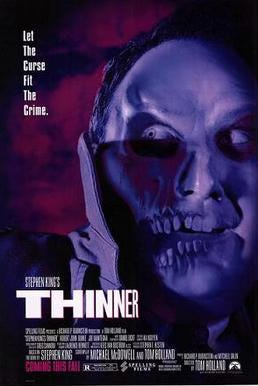

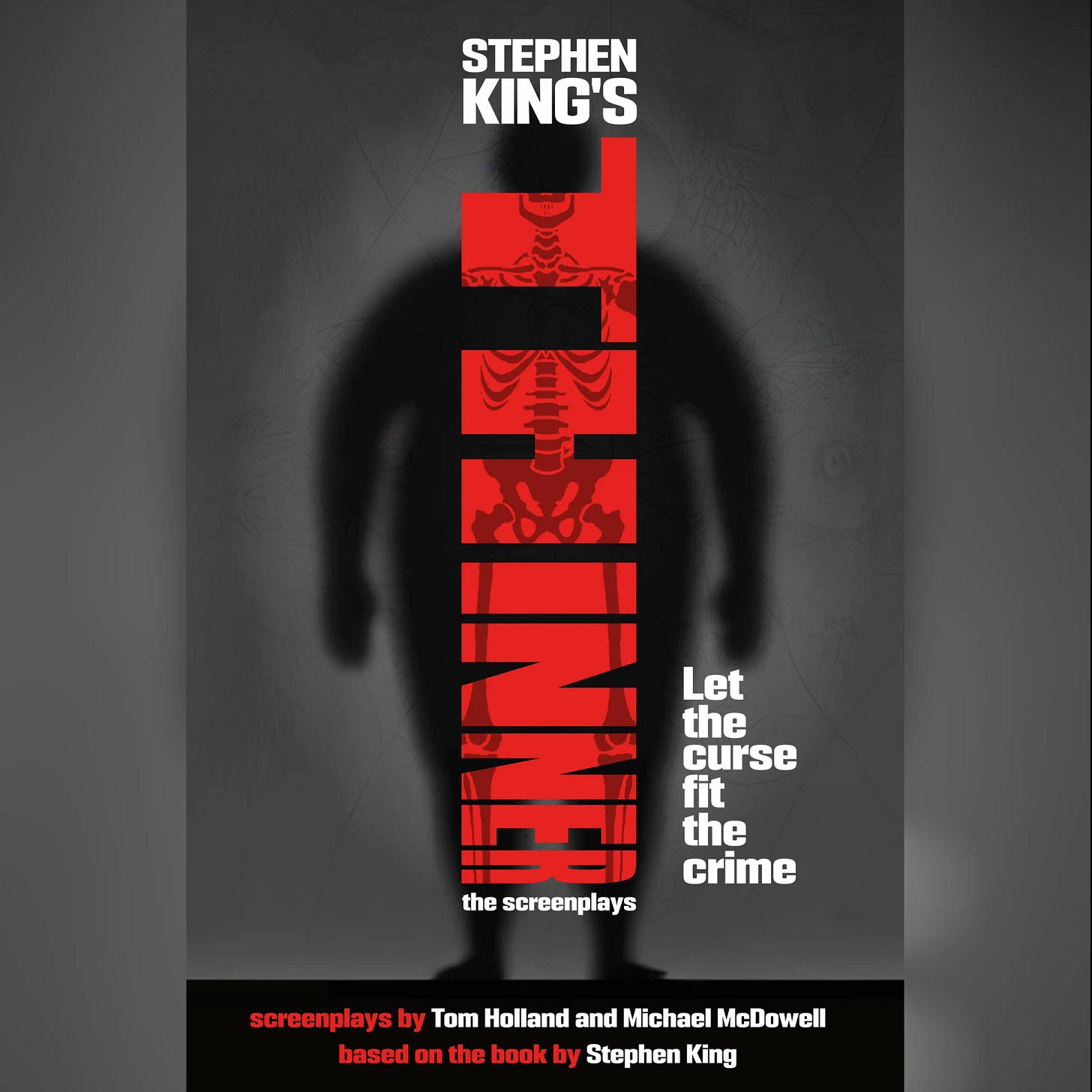
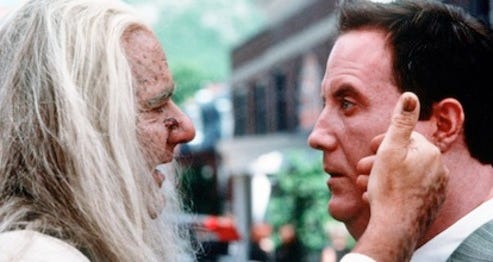

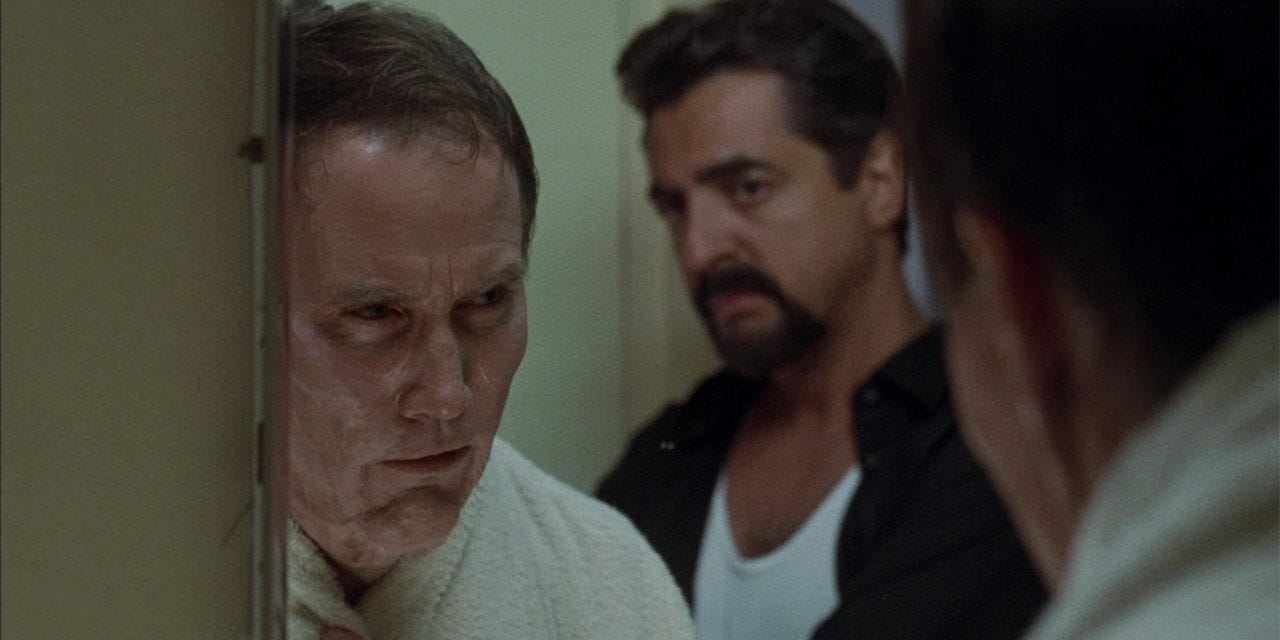
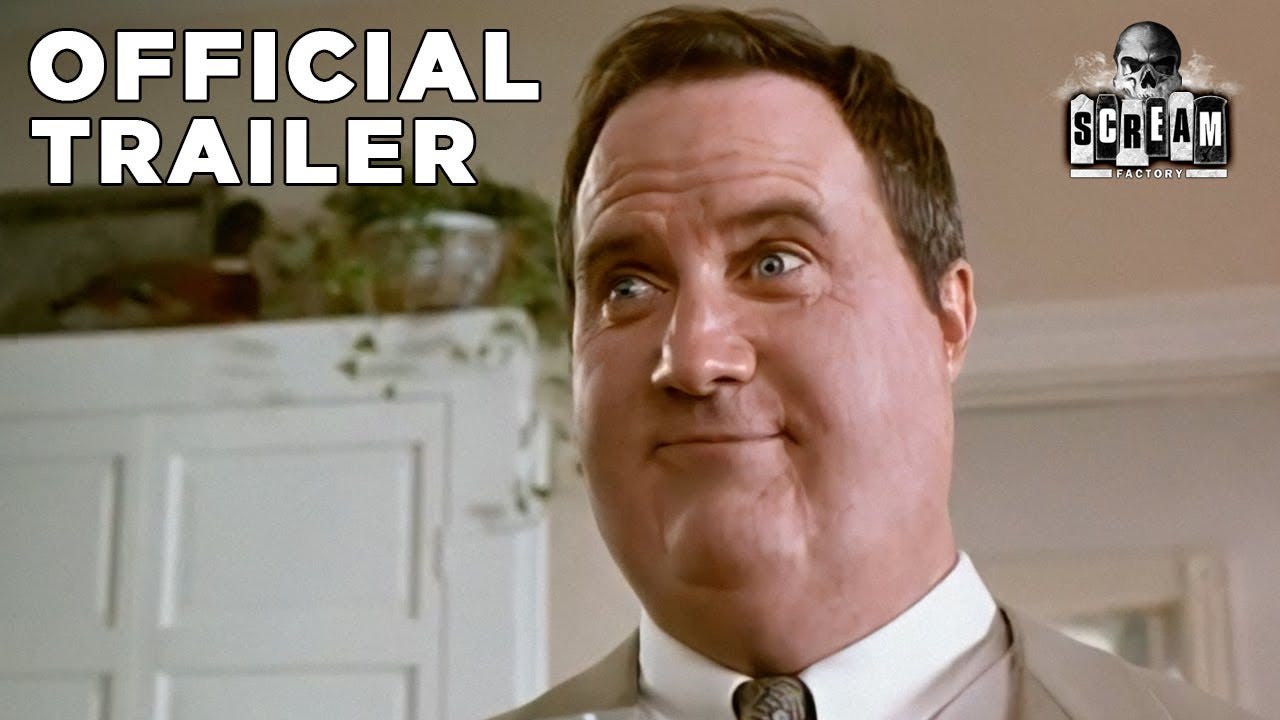
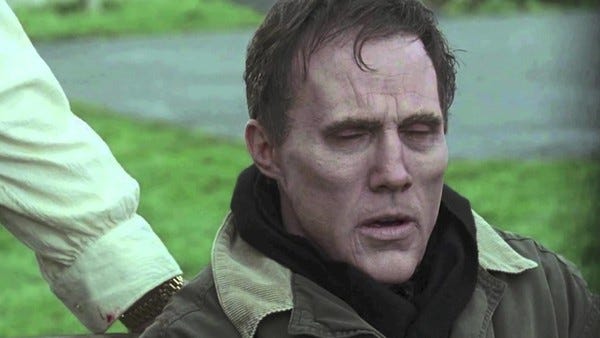
My dad and I always quote "eat your own pie, white man from town. Die clean," to each other.
I like that the film's X factor is called out. I recall only kind of liking Thinner when I first saw it, but I also never forgot it, even if it's not remotely powerful, just somehow memorable.